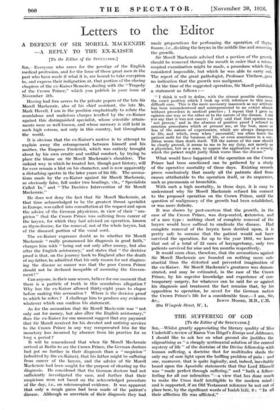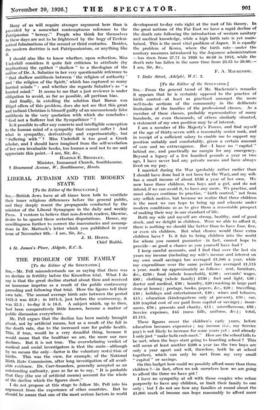THE SUFFERING OF GOD
[To the Editor of the SPECTATOR.] Sin,—Whilst greatly appreciating the literary quality of Miss Underhill's review of Baron Von IliigePs Essays and Addresses, I should like to ask her on what ground she justifies the stigmatizing as " a cheaply sentimental solution of the central mystery of life " of the doctrine of the Divine fellowship with human suffering, a doctrine that for multitudes sheds the only ray of sure light upon the baffling problem of pain : and one, moreover, that is quite logically, and, indeed, inevitably based upon the Apostolic statements that Our Lord Himself was "made perfect through suffering," and "bath a fellow- feeling for all our infirmities "—a view that has done much to make the Cross itself intelligible to the modern mind : and is supported, if an Old Testament reference be not out of place here, by the significant words of Isaiah lxiii. 9 : " In all their affliction He was afflicted."
Many of us will require stronger argument here than is provided by a somewhat contemptuous reference to the patripassian " heresy." People who think for themselves in these days are not to be frightened by the bogy of Ecclesi- astical fulminations of the second or third centuries. Besides, the modern doctrine is not Patripassianism, or anything like it.
I should also like to know whether, upon reflection, Miss Underhill considers it quite fair criticism to attribute (by implication) the epithet " shallow " to a theologian of the calibre of Dr. A. Sabatier in her very questionable reference to " that shallow antithesis between ' the religion of authority ' and ' the religion of the Spirit,' which has captured so many hurried minds " : and whether she regards Sabatier's as " a hurried mind." It seems to me that a just reviewer is under obligation to avoid, as far as possible, all partisan bias.
And finally, in extolling the solution that Baron von Thigel offers of this problem, does she not see that this great and radiant Christian is himself guilty of an unconsciously false antithesis in the very quotation with which she concludes : God not a Sufferer but the Sympathizer " ?
Is it possible to offer any concrete and intelligible conception to the human mind of a sympathy that cannot suffer ? And what is sympathy, derivatively and experimentally, but " Suffering with " ? Miss Underhill is too good a Greek scholar, and I should have imagined from the self-revelation of her own invaluable books, too human a soul not to see and appreciate this point.—I am, Sir, &c., HAROLD E. BRIERLEY, Minister, Immanuel Church, Southbourne.
7 Stourwood Avenue, W. Southbourne, Hants.































































 Previous page
Previous page